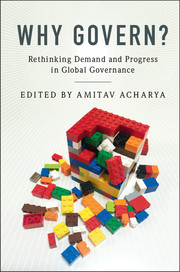Book contents
- Frontmatter
- Contents
- List of Figures
- List of Tables
- Notes on Contributors
- Acknowledgments
- List of Abbreviations
- 1 Rethinking Demand, Purpose and Progress in Global Governance: An Introduction
- Part I The Changing Concept of Global Governance
- Part II Issue Areas
- 5 Conflicts and Security
- 6 Human Rights
- 7 Atrocity Crimes
- 8 Trade
- 9 Finance
- 10 Climate
- 11 Refugees
- 12 Health
- 13 Cyberspace and Social Media
- 14 The Contested Quest for Global Governance: Conclusions and Directions for Further Research
- Bibliography
- Index
5 - Conflicts and Security
from Part II - Issue Areas
Published online by Cambridge University Press: 05 September 2016
- Frontmatter
- Contents
- List of Figures
- List of Tables
- Notes on Contributors
- Acknowledgments
- List of Abbreviations
- 1 Rethinking Demand, Purpose and Progress in Global Governance: An Introduction
- Part I The Changing Concept of Global Governance
- Part II Issue Areas
- 5 Conflicts and Security
- 6 Human Rights
- 7 Atrocity Crimes
- 8 Trade
- 9 Finance
- 10 Climate
- 11 Refugees
- 12 Health
- 13 Cyberspace and Social Media
- 14 The Contested Quest for Global Governance: Conclusions and Directions for Further Research
- Bibliography
- Index
Summary
The end of the Cold War transformed the global security architecture. It removed a major source of political conflict from the international system and liberated the UN from more than four decades of virtual political paralysis. Popular concerns about the threat of global nuclear war that had fueled a worldwide anti-nuclear movement largely disappeared. The ending of East–West hostilities also meant that both Cold War alliance systems – NATO and the Warsaw Pact – lost their strategic raison d’être. The Warsaw Pact ceased to exist in 1991, while NATO shrank sharply in the 1990s. NATO defense budgets decreased by 30 percent; military force levels by 28 to 40 percent, while US armed forces in Europe shrank by two-thirds between 1991 and 1997 and NATO strategic planners pondered the future of an alliance that had lost its traditional rationale, but had not yet found a new strategic role.
Absent the communist threat that had sustained the alliance for more than forty years, Western policy began increasingly to focus on what appeared to be the growing threat of violent instability in the developing world – and in the Balkans. Less than five years after the ending of East/West hostilities, Saddam Hussein had invaded and occupied Kuwait in an act of gross unprovoked aggression, the break-up of Yugoslavia had led to a savage civil war in Bosnia, the UN peacekeeping mission in Somalia had collapsed in the wake of an abortive US attempt to kill a Somali warlord, and an estimated 800,000 Tutsis and moderate Hutus had been killed in the Rwandan genocide.
In 1990, noted realist scholar, John Mearsheimer, famously argued that the world could come to miss the Cold War.
The conditions that have made for decades of peace in the West are fast disappearing, as Europe prepares to return to the multi-polar system that, between 1648 and 1945, bred one destructive conflict after another.
The end of the Cold War had a major impact on security in the developing world where the overwhelming majority of wars were now being fought.
- Type
- Chapter
- Information
- Why Govern?Rethinking Demand and Progress in Global Governance, pp. 95 - 120Publisher: Cambridge University PressPrint publication year: 2016



